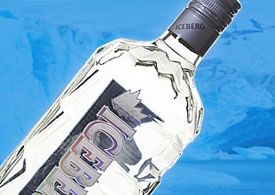
"This has been a lean year for icebergs," said Frank Heaps, CEO of Iceberg Vodka. "Our product's exceptional smoothness and taste is very much a result of the iceberg water, which comes from icebergs formed 12,000 years ago, when mother nature was still a virgin. If they cannot be found near St. John's where the product is made we are forced to go further afield to find them."
"The reason that icebergs are so important for Iceberg Vodka is more than just the name. Technically speaking, tap water, which many spirits are made with, typically contains 200-300 of impurities while water from icebergs contains just .04 ppm," Heaps explains.
The changing weather patterns are causing icebergs to mostly abandon their southerly journey past Newfoundland through "Iceberg Alley."









